Contract Law: Analysis of Balfour v. Balfour and Merritt v. Merritt
VerifiedAdded on 2023/01/03
|7
|1774
|197
Report
AI Summary
This report provides a comprehensive analysis of contract law, specifically focusing on the critical element of 'intention to create legal relations.' The report begins with an introduction to contract law, outlining the essential components required for a valid contract, including offer, acceptance, consideration, and the crucial element of intention to create legal relations. The main body of the report delves into a comparative analysis of two landmark cases: Balfour v. Balfour and Merritt v. Merritt. The report examines the facts, judgments, and legal reasoning employed in each case, highlighting the distinction between domestic and commercial agreements and the presumptions applied by the courts. Balfour v. Balfour examines the legal status of agreements within a marriage, while Merritt v. Merritt addresses agreements made after separation. The report also explores the application of the objective test to determine contractual intent. The report concludes by summarizing the key findings, emphasizing the role of the English courts in shaping the doctrine of intention to create legal relations, and the impact of these cases on contract law principles.

Contract Law
(Individual CW-2)
(Individual CW-2)
Paraphrase This Document
Need a fresh take? Get an instant paraphrase of this document with our AI Paraphraser

Table of Contents
INTRODUCTION ..........................................................................................................................3
MAIN BODY ..................................................................................................................................3
Part 1...........................................................................................................................................3
Part 2...........................................................................................................................................5
CONCLUSION ...............................................................................................................................6
REFERENCES................................................................................................................................7
INTRODUCTION ..........................................................................................................................3
MAIN BODY ..................................................................................................................................3
Part 1...........................................................................................................................................3
Part 2...........................................................................................................................................5
CONCLUSION ...............................................................................................................................6
REFERENCES................................................................................................................................7
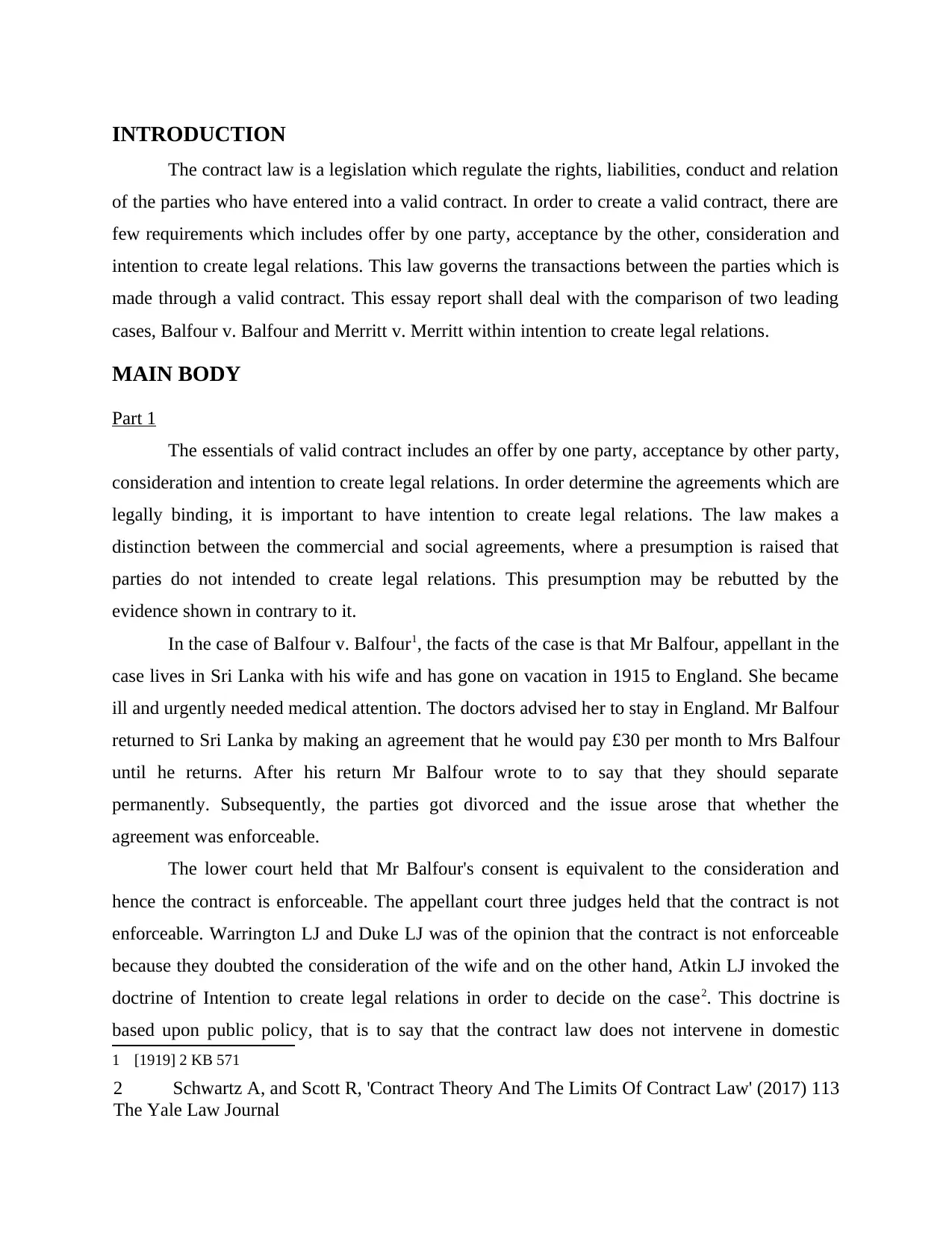
INTRODUCTION
The contract law is a legislation which regulate the rights, liabilities, conduct and relation
of the parties who have entered into a valid contract. In order to create a valid contract, there are
few requirements which includes offer by one party, acceptance by the other, consideration and
intention to create legal relations. This law governs the transactions between the parties which is
made through a valid contract. This essay report shall deal with the comparison of two leading
cases, Balfour v. Balfour and Merritt v. Merritt within intention to create legal relations.
MAIN BODY
Part 1
The essentials of valid contract includes an offer by one party, acceptance by other party,
consideration and intention to create legal relations. In order determine the agreements which are
legally binding, it is important to have intention to create legal relations. The law makes a
distinction between the commercial and social agreements, where a presumption is raised that
parties do not intended to create legal relations. This presumption may be rebutted by the
evidence shown in contrary to it.
In the case of Balfour v. Balfour1, the facts of the case is that Mr Balfour, appellant in the
case lives in Sri Lanka with his wife and has gone on vacation in 1915 to England. She became
ill and urgently needed medical attention. The doctors advised her to stay in England. Mr Balfour
returned to Sri Lanka by making an agreement that he would pay £30 per month to Mrs Balfour
until he returns. After his return Mr Balfour wrote to to say that they should separate
permanently. Subsequently, the parties got divorced and the issue arose that whether the
agreement was enforceable.
The lower court held that Mr Balfour's consent is equivalent to the consideration and
hence the contract is enforceable. The appellant court three judges held that the contract is not
enforceable. Warrington LJ and Duke LJ was of the opinion that the contract is not enforceable
because they doubted the consideration of the wife and on the other hand, Atkin LJ invoked the
doctrine of Intention to create legal relations in order to decide on the case2. This doctrine is
based upon public policy, that is to say that the contract law does not intervene in domestic
1 [1919] 2 KB 571
2 Schwartz A, and Scott R, 'Contract Theory And The Limits Of Contract Law' (2017) 113
The Yale Law Journal
The contract law is a legislation which regulate the rights, liabilities, conduct and relation
of the parties who have entered into a valid contract. In order to create a valid contract, there are
few requirements which includes offer by one party, acceptance by the other, consideration and
intention to create legal relations. This law governs the transactions between the parties which is
made through a valid contract. This essay report shall deal with the comparison of two leading
cases, Balfour v. Balfour and Merritt v. Merritt within intention to create legal relations.
MAIN BODY
Part 1
The essentials of valid contract includes an offer by one party, acceptance by other party,
consideration and intention to create legal relations. In order determine the agreements which are
legally binding, it is important to have intention to create legal relations. The law makes a
distinction between the commercial and social agreements, where a presumption is raised that
parties do not intended to create legal relations. This presumption may be rebutted by the
evidence shown in contrary to it.
In the case of Balfour v. Balfour1, the facts of the case is that Mr Balfour, appellant in the
case lives in Sri Lanka with his wife and has gone on vacation in 1915 to England. She became
ill and urgently needed medical attention. The doctors advised her to stay in England. Mr Balfour
returned to Sri Lanka by making an agreement that he would pay £30 per month to Mrs Balfour
until he returns. After his return Mr Balfour wrote to to say that they should separate
permanently. Subsequently, the parties got divorced and the issue arose that whether the
agreement was enforceable.
The lower court held that Mr Balfour's consent is equivalent to the consideration and
hence the contract is enforceable. The appellant court three judges held that the contract is not
enforceable. Warrington LJ and Duke LJ was of the opinion that the contract is not enforceable
because they doubted the consideration of the wife and on the other hand, Atkin LJ invoked the
doctrine of Intention to create legal relations in order to decide on the case2. This doctrine is
based upon public policy, that is to say that the contract law does not intervene in domestic
1 [1919] 2 KB 571
2 Schwartz A, and Scott R, 'Contract Theory And The Limits Of Contract Law' (2017) 113
The Yale Law Journal
⊘ This is a preview!⊘
Do you want full access?
Subscribe today to unlock all pages.

Trusted by 1+ million students worldwide
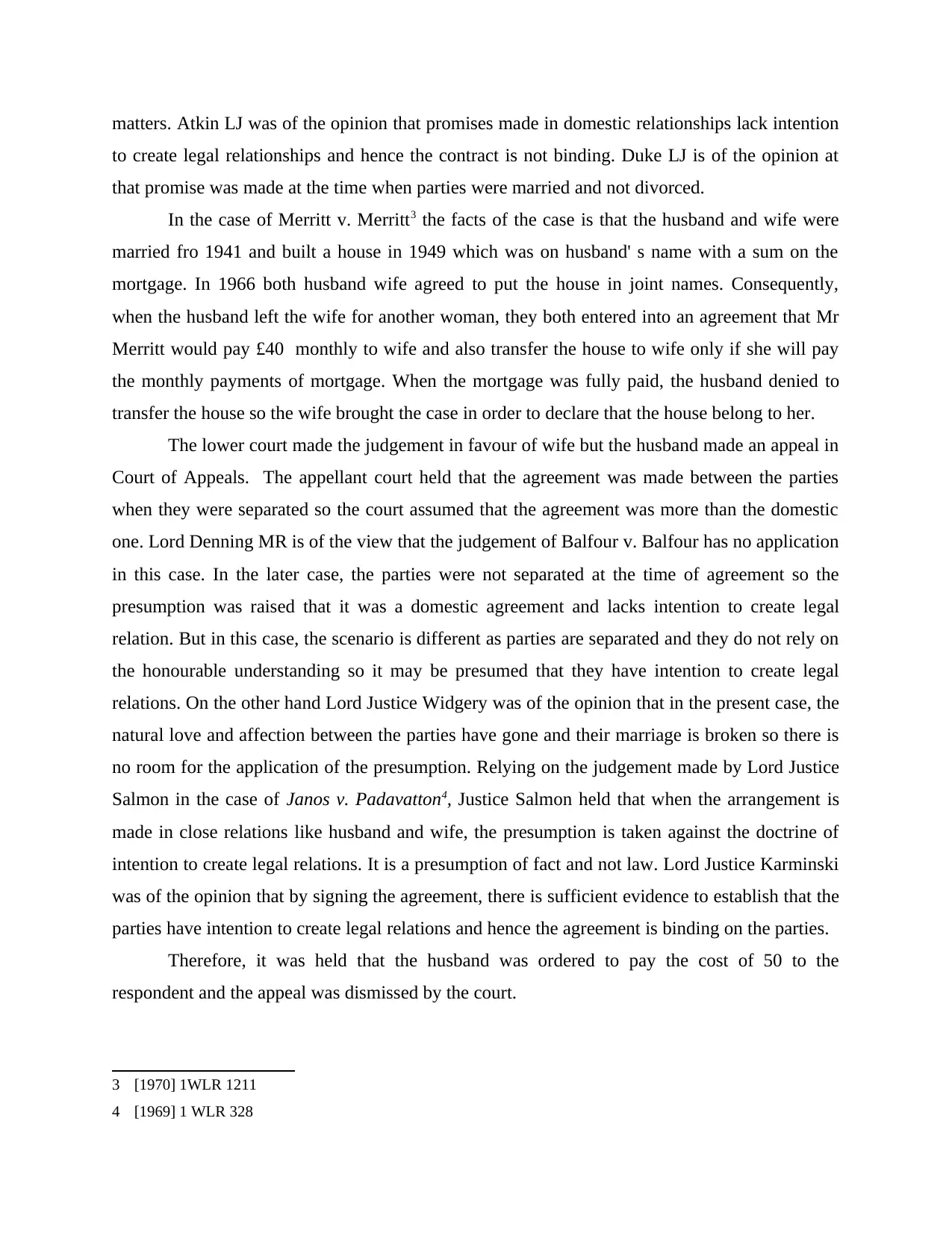
matters. Atkin LJ was of the opinion that promises made in domestic relationships lack intention
to create legal relationships and hence the contract is not binding. Duke LJ is of the opinion at
that promise was made at the time when parties were married and not divorced.
In the case of Merritt v. Merritt3 the facts of the case is that the husband and wife were
married fro 1941 and built a house in 1949 which was on husband' s name with a sum on the
mortgage. In 1966 both husband wife agreed to put the house in joint names. Consequently,
when the husband left the wife for another woman, they both entered into an agreement that Mr
Merritt would pay £40 monthly to wife and also transfer the house to wife only if she will pay
the monthly payments of mortgage. When the mortgage was fully paid, the husband denied to
transfer the house so the wife brought the case in order to declare that the house belong to her.
The lower court made the judgement in favour of wife but the husband made an appeal in
Court of Appeals. The appellant court held that the agreement was made between the parties
when they were separated so the court assumed that the agreement was more than the domestic
one. Lord Denning MR is of the view that the judgement of Balfour v. Balfour has no application
in this case. In the later case, the parties were not separated at the time of agreement so the
presumption was raised that it was a domestic agreement and lacks intention to create legal
relation. But in this case, the scenario is different as parties are separated and they do not rely on
the honourable understanding so it may be presumed that they have intention to create legal
relations. On the other hand Lord Justice Widgery was of the opinion that in the present case, the
natural love and affection between the parties have gone and their marriage is broken so there is
no room for the application of the presumption. Relying on the judgement made by Lord Justice
Salmon in the case of Janos v. Padavatton4, Justice Salmon held that when the arrangement is
made in close relations like husband and wife, the presumption is taken against the doctrine of
intention to create legal relations. It is a presumption of fact and not law. Lord Justice Karminski
was of the opinion that by signing the agreement, there is sufficient evidence to establish that the
parties have intention to create legal relations and hence the agreement is binding on the parties.
Therefore, it was held that the husband was ordered to pay the cost of 50 to the
respondent and the appeal was dismissed by the court.
3 [1970] 1WLR 1211
4 [1969] 1 WLR 328
to create legal relationships and hence the contract is not binding. Duke LJ is of the opinion at
that promise was made at the time when parties were married and not divorced.
In the case of Merritt v. Merritt3 the facts of the case is that the husband and wife were
married fro 1941 and built a house in 1949 which was on husband' s name with a sum on the
mortgage. In 1966 both husband wife agreed to put the house in joint names. Consequently,
when the husband left the wife for another woman, they both entered into an agreement that Mr
Merritt would pay £40 monthly to wife and also transfer the house to wife only if she will pay
the monthly payments of mortgage. When the mortgage was fully paid, the husband denied to
transfer the house so the wife brought the case in order to declare that the house belong to her.
The lower court made the judgement in favour of wife but the husband made an appeal in
Court of Appeals. The appellant court held that the agreement was made between the parties
when they were separated so the court assumed that the agreement was more than the domestic
one. Lord Denning MR is of the view that the judgement of Balfour v. Balfour has no application
in this case. In the later case, the parties were not separated at the time of agreement so the
presumption was raised that it was a domestic agreement and lacks intention to create legal
relation. But in this case, the scenario is different as parties are separated and they do not rely on
the honourable understanding so it may be presumed that they have intention to create legal
relations. On the other hand Lord Justice Widgery was of the opinion that in the present case, the
natural love and affection between the parties have gone and their marriage is broken so there is
no room for the application of the presumption. Relying on the judgement made by Lord Justice
Salmon in the case of Janos v. Padavatton4, Justice Salmon held that when the arrangement is
made in close relations like husband and wife, the presumption is taken against the doctrine of
intention to create legal relations. It is a presumption of fact and not law. Lord Justice Karminski
was of the opinion that by signing the agreement, there is sufficient evidence to establish that the
parties have intention to create legal relations and hence the agreement is binding on the parties.
Therefore, it was held that the husband was ordered to pay the cost of 50 to the
respondent and the appeal was dismissed by the court.
3 [1970] 1WLR 1211
4 [1969] 1 WLR 328
Paraphrase This Document
Need a fresh take? Get an instant paraphrase of this document with our AI Paraphraser
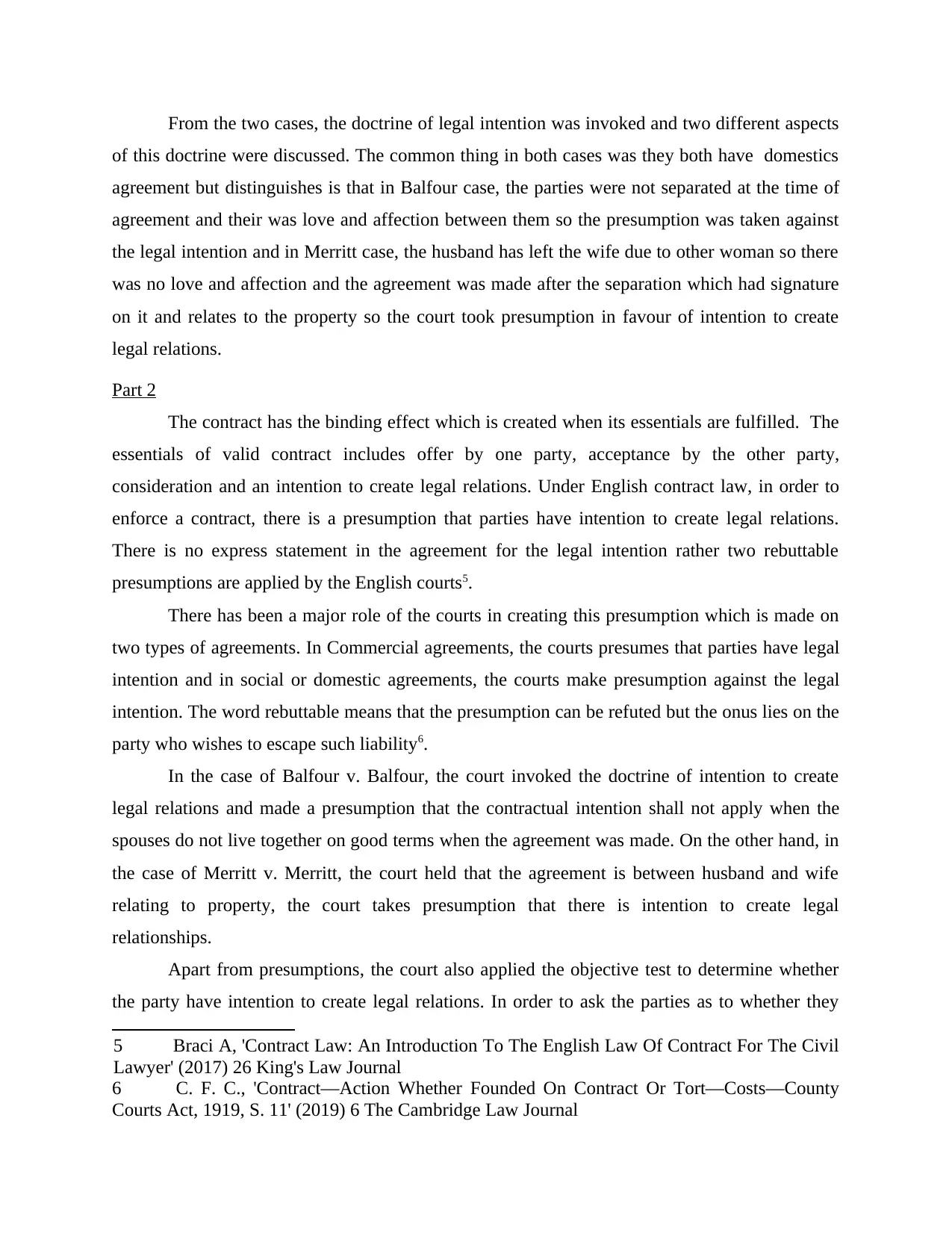
From the two cases, the doctrine of legal intention was invoked and two different aspects
of this doctrine were discussed. The common thing in both cases was they both have domestics
agreement but distinguishes is that in Balfour case, the parties were not separated at the time of
agreement and their was love and affection between them so the presumption was taken against
the legal intention and in Merritt case, the husband has left the wife due to other woman so there
was no love and affection and the agreement was made after the separation which had signature
on it and relates to the property so the court took presumption in favour of intention to create
legal relations.
Part 2
The contract has the binding effect which is created when its essentials are fulfilled. The
essentials of valid contract includes offer by one party, acceptance by the other party,
consideration and an intention to create legal relations. Under English contract law, in order to
enforce a contract, there is a presumption that parties have intention to create legal relations.
There is no express statement in the agreement for the legal intention rather two rebuttable
presumptions are applied by the English courts5.
There has been a major role of the courts in creating this presumption which is made on
two types of agreements. In Commercial agreements, the courts presumes that parties have legal
intention and in social or domestic agreements, the courts make presumption against the legal
intention. The word rebuttable means that the presumption can be refuted but the onus lies on the
party who wishes to escape such liability6.
In the case of Balfour v. Balfour, the court invoked the doctrine of intention to create
legal relations and made a presumption that the contractual intention shall not apply when the
spouses do not live together on good terms when the agreement was made. On the other hand, in
the case of Merritt v. Merritt, the court held that the agreement is between husband and wife
relating to property, the court takes presumption that there is intention to create legal
relationships.
Apart from presumptions, the court also applied the objective test to determine whether
the party have intention to create legal relations. In order to ask the parties as to whether they
5 Braci A, 'Contract Law: An Introduction To The English Law Of Contract For The Civil
Lawyer' (2017) 26 King's Law Journal
6 C. F. C., 'Contract—Action Whether Founded On Contract Or Tort—Costs—County
Courts Act, 1919, S. 11' (2019) 6 The Cambridge Law Journal
of this doctrine were discussed. The common thing in both cases was they both have domestics
agreement but distinguishes is that in Balfour case, the parties were not separated at the time of
agreement and their was love and affection between them so the presumption was taken against
the legal intention and in Merritt case, the husband has left the wife due to other woman so there
was no love and affection and the agreement was made after the separation which had signature
on it and relates to the property so the court took presumption in favour of intention to create
legal relations.
Part 2
The contract has the binding effect which is created when its essentials are fulfilled. The
essentials of valid contract includes offer by one party, acceptance by the other party,
consideration and an intention to create legal relations. Under English contract law, in order to
enforce a contract, there is a presumption that parties have intention to create legal relations.
There is no express statement in the agreement for the legal intention rather two rebuttable
presumptions are applied by the English courts5.
There has been a major role of the courts in creating this presumption which is made on
two types of agreements. In Commercial agreements, the courts presumes that parties have legal
intention and in social or domestic agreements, the courts make presumption against the legal
intention. The word rebuttable means that the presumption can be refuted but the onus lies on the
party who wishes to escape such liability6.
In the case of Balfour v. Balfour, the court invoked the doctrine of intention to create
legal relations and made a presumption that the contractual intention shall not apply when the
spouses do not live together on good terms when the agreement was made. On the other hand, in
the case of Merritt v. Merritt, the court held that the agreement is between husband and wife
relating to property, the court takes presumption that there is intention to create legal
relationships.
Apart from presumptions, the court also applied the objective test to determine whether
the party have intention to create legal relations. In order to ask the parties as to whether they
5 Braci A, 'Contract Law: An Introduction To The English Law Of Contract For The Civil
Lawyer' (2017) 26 King's Law Journal
6 C. F. C., 'Contract—Action Whether Founded On Contract Or Tort—Costs—County
Courts Act, 1919, S. 11' (2019) 6 The Cambridge Law Journal
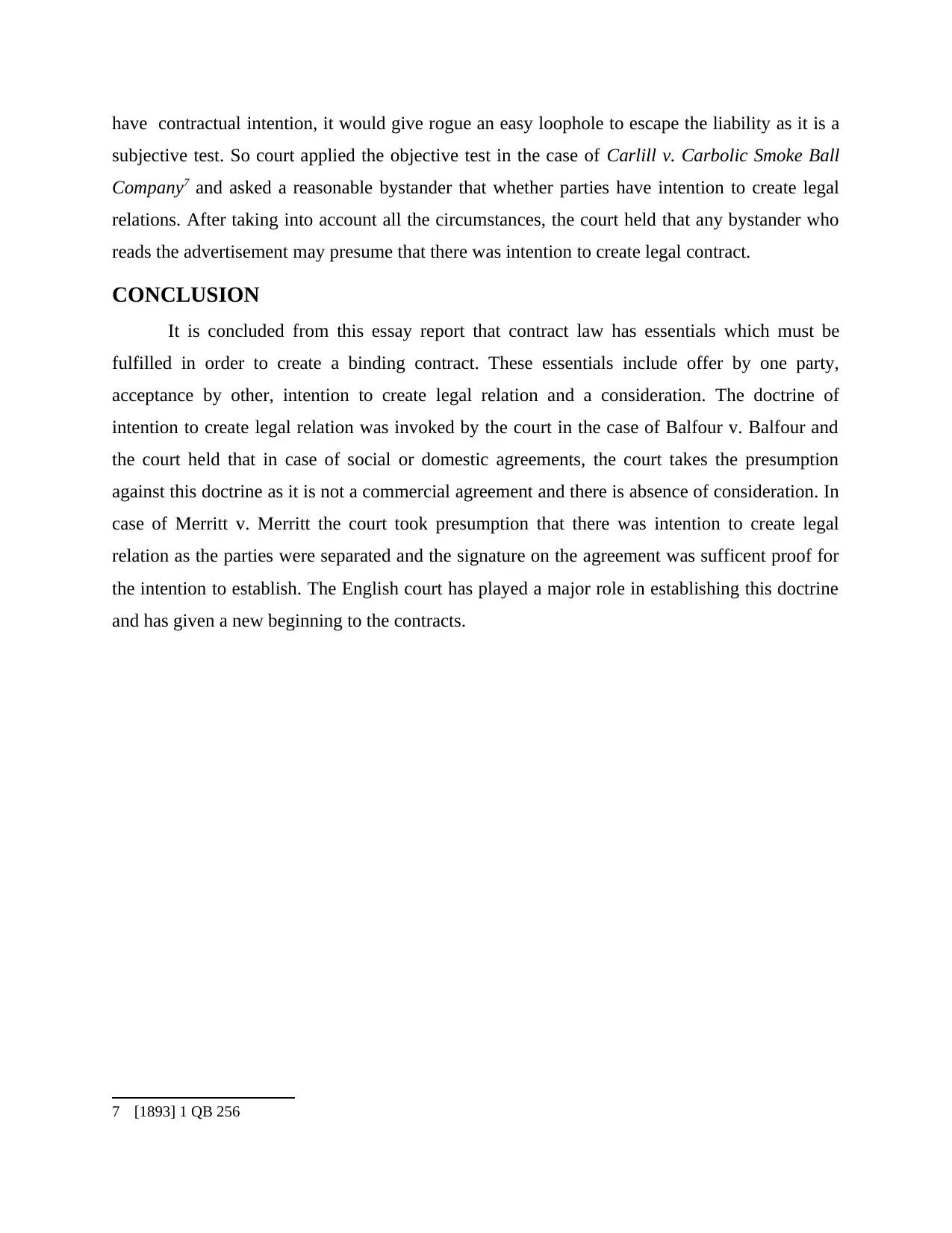
have contractual intention, it would give rogue an easy loophole to escape the liability as it is a
subjective test. So court applied the objective test in the case of Carlill v. Carbolic Smoke Ball
Company7 and asked a reasonable bystander that whether parties have intention to create legal
relations. After taking into account all the circumstances, the court held that any bystander who
reads the advertisement may presume that there was intention to create legal contract.
CONCLUSION
It is concluded from this essay report that contract law has essentials which must be
fulfilled in order to create a binding contract. These essentials include offer by one party,
acceptance by other, intention to create legal relation and a consideration. The doctrine of
intention to create legal relation was invoked by the court in the case of Balfour v. Balfour and
the court held that in case of social or domestic agreements, the court takes the presumption
against this doctrine as it is not a commercial agreement and there is absence of consideration. In
case of Merritt v. Merritt the court took presumption that there was intention to create legal
relation as the parties were separated and the signature on the agreement was sufficent proof for
the intention to establish. The English court has played a major role in establishing this doctrine
and has given a new beginning to the contracts.
7 [1893] 1 QB 256
subjective test. So court applied the objective test in the case of Carlill v. Carbolic Smoke Ball
Company7 and asked a reasonable bystander that whether parties have intention to create legal
relations. After taking into account all the circumstances, the court held that any bystander who
reads the advertisement may presume that there was intention to create legal contract.
CONCLUSION
It is concluded from this essay report that contract law has essentials which must be
fulfilled in order to create a binding contract. These essentials include offer by one party,
acceptance by other, intention to create legal relation and a consideration. The doctrine of
intention to create legal relation was invoked by the court in the case of Balfour v. Balfour and
the court held that in case of social or domestic agreements, the court takes the presumption
against this doctrine as it is not a commercial agreement and there is absence of consideration. In
case of Merritt v. Merritt the court took presumption that there was intention to create legal
relation as the parties were separated and the signature on the agreement was sufficent proof for
the intention to establish. The English court has played a major role in establishing this doctrine
and has given a new beginning to the contracts.
7 [1893] 1 QB 256
⊘ This is a preview!⊘
Do you want full access?
Subscribe today to unlock all pages.

Trusted by 1+ million students worldwide
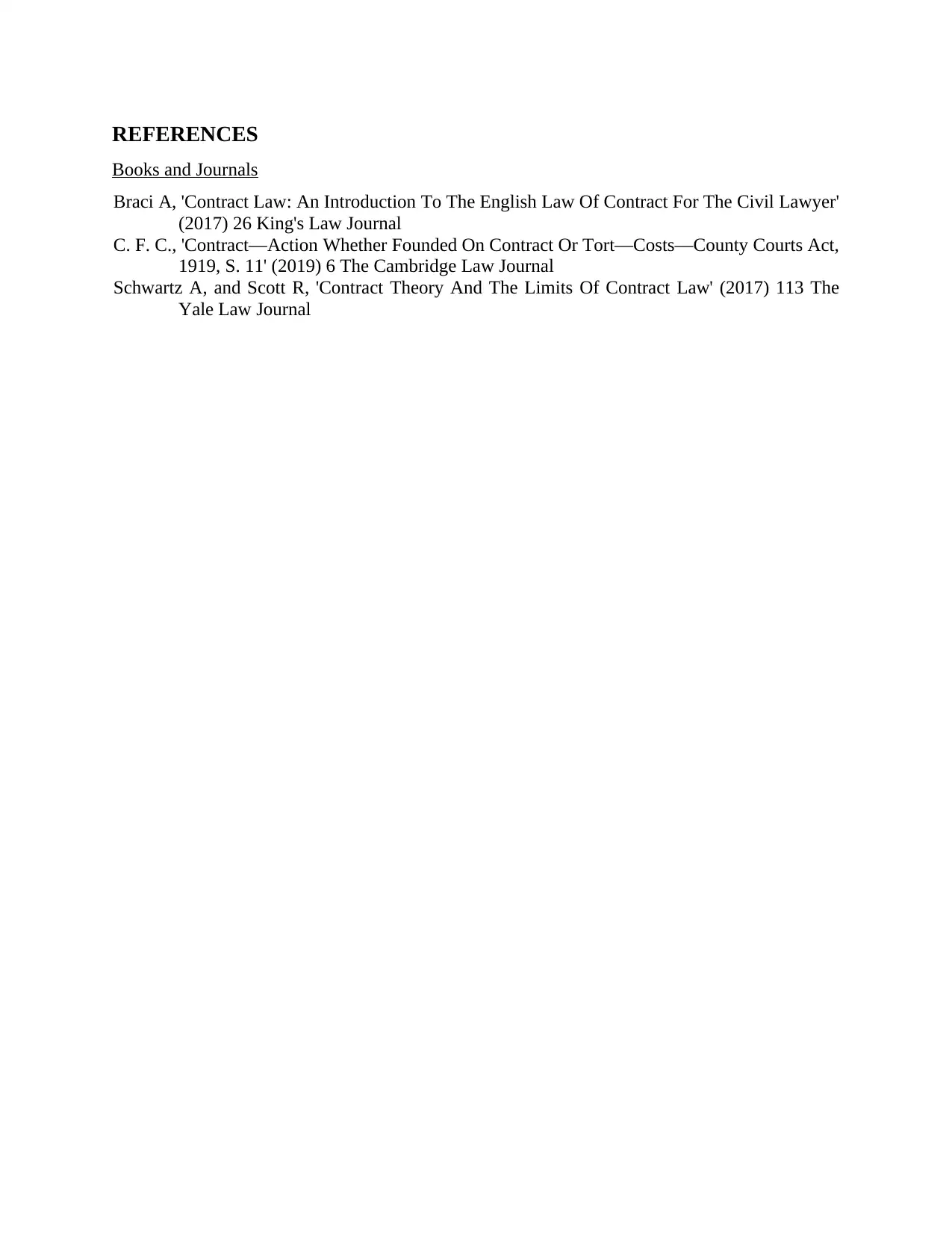
REFERENCES
Books and Journals
Braci A, 'Contract Law: An Introduction To The English Law Of Contract For The Civil Lawyer'
(2017) 26 King's Law Journal
C. F. C., 'Contract—Action Whether Founded On Contract Or Tort—Costs—County Courts Act,
1919, S. 11' (2019) 6 The Cambridge Law Journal
Schwartz A, and Scott R, 'Contract Theory And The Limits Of Contract Law' (2017) 113 The
Yale Law Journal
Books and Journals
Braci A, 'Contract Law: An Introduction To The English Law Of Contract For The Civil Lawyer'
(2017) 26 King's Law Journal
C. F. C., 'Contract—Action Whether Founded On Contract Or Tort—Costs—County Courts Act,
1919, S. 11' (2019) 6 The Cambridge Law Journal
Schwartz A, and Scott R, 'Contract Theory And The Limits Of Contract Law' (2017) 113 The
Yale Law Journal
1 out of 7
Related Documents
Your All-in-One AI-Powered Toolkit for Academic Success.
+13062052269
info@desklib.com
Available 24*7 on WhatsApp / Email
![[object Object]](/_next/static/media/star-bottom.7253800d.svg)
Unlock your academic potential
Copyright © 2020–2026 A2Z Services. All Rights Reserved. Developed and managed by ZUCOL.





